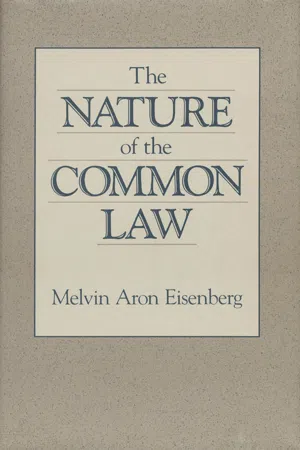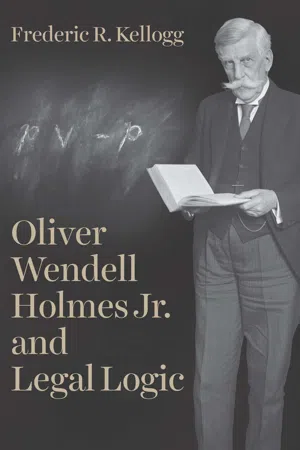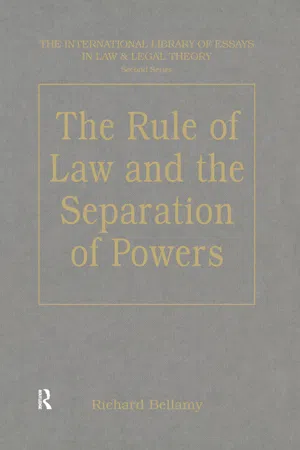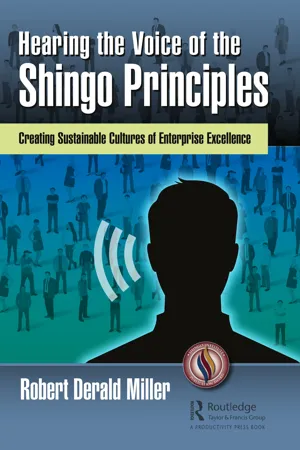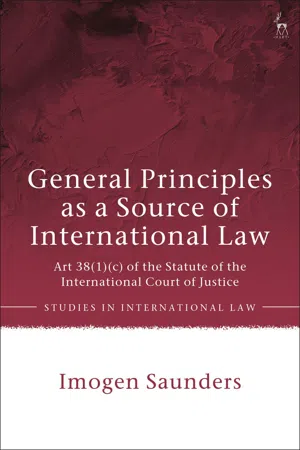Law
Legal Principles
Legal principles are fundamental rules and guidelines that form the basis of the legal system. They are derived from legislation, judicial decisions, and legal scholarship, and serve as the foundation for interpreting and applying the law. These principles help ensure consistency, fairness, and predictability in legal outcomes.
Written by Perlego with AI-assistance
6 Key excerpts on "Legal Principles"
Learn about this page
Index pages curate the most relevant extracts from our library of academic textbooks. They’ve been created using an in-house natural language model (NLM), each adding context and meaning to key research topics.
- eBook - ePub
- Melvin Aron Eisenberg(Author)
- 1991(Publication Date)
- Harvard University Press(Publisher)
The direct relationship between principles and applicable social propositions also helps to explain the roles played by principles after they are originally formulated and established. One such role is to serve as a basis for new legal rules. At one level, principles serve as the basis for new legal rules in the sense that relatively general standards serve as the basis for relatively specific standards. For example, the principle that on breach of a bargain contract the injured party is entitled to expectation damages has served as the basis for a variety of specific rules, such as the rule that if a buyer breaches a contract for services, the seller’s damages are measured by the contract price minus the costs remaining to be incurred. At a deeper level, principles serve as a basis for new legal rules by mediating between legal rules and social propositions. Because principles rest in substantial part on applicable social propositions, they have the effect of internalizing those propositions in the law and making them into institutional values. Accordingly, when the courts draw on a principle as the basis of a new legal rule they draw directly on a doctrinal proposition (the principle) and indirectly on applicable social propositions (which generate the principle).Another role played by principles after they are originally formulated and established is to serve as a basis for reexamining and refashioning previously established rules. In this role principles allow the courts to criticize, reexplain, and reformulate established rules in the light of institutionalized values. Because of the direct relationship between principles and applicable social propositions, by using new principles to reexamine established rules the courts can refashion relatively specific doctrinal propositions that fail to satisfy the standard of social congruence through an appeal to relatively general doctrinal propositions that do satisfy that standard. This use of new principles to critically reexamine and refashion established rules is reflected in the concept of the law working itself pure. - eBook - ePub
- Frederic R. Kellogg(Author)
- 2018(Publication Date)
- University of Chicago Press(Publisher)
CHAPTER SEVENPrinciples
This chapter applies the lessons of the social continuum of inquiry to the operation and understanding of Legal Principles. * * *I put it to you that the main constituent of the judicial process is precisely that it must be genuinely principled, resting with respect to every step that is involved in reaching judgment on analysis and reasons quite transcending the immediate result that is achieved. To be sure, the courts decide, or should decide, only the case they have before them. But must they not decide on grounds of adequate neutrality and generality, tested not only by the instant application but by others that the principles imply? Is it not the very essence of judicial method to insist upon attending to such other cases, preferably those involving an opposing interest in evaluating any principle involved?—Herbert Wechsler, “Toward Neutral Principles of Constitutional Law,” 1959 Oliver Wendell Holmes Lecture at Harvard Law SchoolAn ironic legacy of legal realism, and the anxiety accompanying it, rather than a reformed induction, was a turn to “general principles.” In the wake of this turn, it is now widely considered appropriate for judges to appeal to general principles as grounds for particular decisions, when it appears that a boundary of “indeterminacy,” or the limit of clear settled legal authority, is crossed—a boundary whose precise location has been constantly contested by scholars, and must inevitably in real life be discovered within the mind of the deciding judge. So, reinforced by this understanding, judges often do appeal to general principles. I will address this turn, which began in the 1950s and continues today despite an emergent skepticism of “principlism” in philosophical ethics.1Legal Principles might be viewed in two contrary ways. They might either be seen as free-standing, unrevisable, and frequently opposing one another in the context of a disputed matter; or they might be open-ended, tentative, and suggesting (though not supporting) alternative options for the matter at hand. In the first view, they can appear irreconcilable, while according to the second they are, in Edward Levi’s words, part of a “moving classification system.” In the first view, the conceptual space of principle is relatively fixed at the moment of decision, and the legal mind is free to roam among them, at risk always of a choice dictated more by subjective preference than logic. According to the second view the legal mind must always hesitate as to whether the matter at hand warrants a decision broader than the particular case, given the immediate complex of circumstances. - Jack Beatson(Author)
- 2021(Publication Date)
- Hart Publishing(Publisher)
The key aspect of the formal conception of the rule of law is that its adherents consider that those values suffice. For them, a legal system in an undemocratic state or in a democratic state which for example permits inequalities based on race, gender or religion, and is to that extent unjust, could nevertheless in principle conform to the rule of law if its rules and principles are clear, prospective and publicly accessible: see for example Raz 1971, 211 and 221. A purely formal conception of the rule of law does not require a Bill of Rights because it only aims to eliminate the kinds of arbitrary governmental power which can unfairly upset citizens’ expectations about their legal obligations and rights: Goldsworthy, 63–64. Even tyrannical laws, and the abhorrent apartheid laws in South Africa before 1994 where peoples’ rights depended on their race, might satisfy the formal concept. This is not because its adherents are indifferent to the content of the law. It is because they consider that the rule of law is only one of the virtues to which the law should conform. For them, other principles, such as fairness and equality, are independent ideals which are needed for the law to be good or just, and the rule of law should not be used to explain those principles.It is important to bear in mind that there are different degrees to which the values of accessibility, clarity and prospectivity are achievable. For example, although the extent to which discretion in a particular context is either desirable or cannot be avoided is controversial, many adherents of the formal concept now accept that certainty and clarity may have to be qualified. It is recognised that those exercising governmental powers in a modern state need some discretion in order to avoid the disadvantages of ‘legalism’. Moreover, where law is dealing with complex technical, medical or scientific issues, there is a limit to the ability of those making it, whether legislators or judges, to produce language that will be fully understood by laypeople.The substantive conception of the rule of law regards law as more than simply what is enacted by the legislature or other state body with the requisite authority, according to the designated procedure, and scrupulously observed by state officials and others implementing it. It is concerned with the content of the law and its values and ideals, and requires, in the words of Sir John Laws 2021 at 19 that the law ‘be imbued with certain norms, standards or principles’ to protect the individual citizen’s autonomy and to constrain ‘the power of government, including democratic government’. One simple example of such substantive values is the presumption of innocence which protects a person charged with a crime and requires the prosecution to prove beyond reasonable doubt that that person is guilty. Referred to as ‘the golden thread’ running through the common law, the approach of the courts to statutory provisions qualifying or restricting it is discussed below at 85. The approach to another value, that of respect for private property rights which protects the right to own and not to be arbitrarily deprived of property without legal authority and without compensation, is discussed at 46, 65 and 140.- eBook - ePub
- Richard Bellamy, Richard Bellamy(Authors)
- 2017(Publication Date)
- Routledge(Publisher)
8 These conditions consist of certain largely formal characteristics that are used to distinguish a system of laws from either a number of ad hoc directives or a collection of customary practices. Some of these qualities relate to the form of law, others to the form of the legal system. With regard to the first, standard criteria include that laws should be general and apply equally to all (though, as we shall see, they may need to take into account relevant differences), be prospective (only invoking retroactivity as a curative measure), public (albeit often through publicly funded experts), clear (avoiding vague terminology open to wide discretionary interpretation) and relatively stable (but not so as to ossify). So far as the second is concerned, laws should be consistent with each other, feasible and congruent with official action. Most importantly, the promulgation, execution and ability to contest the laws should be guided by general, equal, public, clear and relatively stable rules.There are numerous familiar legal norms and practices that exemplify these formal qualities of the law, on the one hand, and the legal system, on the other. For example, those associated with the first are reflected in the notion that there can be no crime without a law, while those linked to the second underpin the view that the court system should be free from extraneous pressures and independent of all authority but the law, and operate according to settled and open procedures that are the same for all citizens. These features give law the regularity needed for it to be a system in any moderately well functioning sense. Without at least some of these elements, neither those subject to the laws nor those appointed to implement them will be able to follow and administer the law respectively in any sort of systematic way.To the degree that rule is by laws which satisfy these criteria, then rule by law will generate a weak form of the Rule of Law. At least for much of the time, people will comply with the law not out of deference to (or fear of) the persons who have made or are upholding it, nor necessarily because they agree with it, but simply because it is the law. Law so understood will be necessary to some degree in societies of any complexity. It satisfies the need for common decisions that can coordinate the collective life of the community in conditions of reasonable disagreement over the nature of the good society. There are many aspects of social life where having almost any rule outweighs the perils or inconvenience of having none. Those with sharp elbows may not like the rule of ‘first come first served’ in shops, but most people benefit from the arrangement and have a less stressful time as a result. Continuous white lines may annoy those drivers who claim to ‘know’ the road or to possess super-fast reactions, but the rest of us have an interest in such people being severely deterred from acting on this belief and in obeying the law. Even in areas which are not collective action problems and involve more contentious moral issues, the need for a common rule so that we know where we stand can lead us to accept laws we dislike – although, as I noted earlier, the place of that law within a more general system of legality (usually including mechanisms for changing or challenging it) also influences our acceptance. - eBook - ePub
Hearing the Voice of the Shingo Principles
Creating Sustainable Cultures of Enterprise Excellence
- Robert Derald Miller(Author)
- 2018(Publication Date)
- Productivity Press(Publisher)
Teamwork, loyalty and innovation are values. They differ in meaning based on the experience of each unique individual. Their meaning and application change over time and our diverse interpretation of them drives our various behaviors. What then makes the difference between the felon and the policeman both possessing the same values?Framework for Understanding PrinciplesBecause a discussion of principles is not a typical business conversation, the following illustration (Figure 3.1 ) may be helpful in framing the discussion of a principle. This model will be referenced throughout the chapter.Figure 3.1 Framework for a principle.The Voice of a PrincipleA principle differs from a value in that it is not subject to personal interpretation; it is a statement of fact that expresses a natural law. Natural laws exist in nature not in the mind or personal opinion of individuals. Laws of nature have at their root some foundational truth. A foundational truth is something that has always been, is now and will always be the way things are. The fixed nature of a foundational truth is the reason a natural law stays the same over time and gives efficacy to a principle. This is a complex statement that will become much clearer as we advance through the chapter.The fixed nature of a foundational truth is the reason a natural law stays the same over time and gives efficacy to a principle.A principle is usually a statement of action that describes the natural law and when followed, governs an outcome. Principles are usually expressed in a way that describes a cause and effect. If you do this, you get that. Principles describe laws of nature that are irrefutable. Men and women do not create principles, they only discover them. Man-made laws attempt to mimic laws of nature by describing actions that should be taken in a society. If you follow the law, everything will be fine, but if you do not, the law usually describes some negative consequence. The difference is that societal laws are man-made; they change over time and their validity is constantly being challenged for one reason or another. In this respect natural laws are much different than man-made laws. - eBook - ePub
General Principles as a Source of International Law
Art 38(1)(c) of the Statute of the International Court of Justice
- Imogen Saunders(Author)
- 2021(Publication Date)
- Hart Publishing(Publisher)
The purpose of this chapter is two-fold. The first aim is to identify types of legal systems different from those usually considered in General Principles analysis, and consider how such systems fit with conceptions of General Principles. Second, this chapter looks to jurisprudence and commentary: both from the systems themselves on General Principles, and international jurisprudence that draws on these systems to establish General Principles.It must be noted from the outset that there are important qualifiers and limitations to this chapter. This is a broad-brush approach to these issues, aimed at sketching an outline rather than comprehensively addressing the legal systems. The amount of jurisprudence alone makes any comprehensive survey well beyond the bounds of this work. As Twining puts it:Students coming to Jurisprudence for the first time are often bewildered and daunted by the disorderly profusion of our heritage of legal thought … One leading British student work discusses the ideas of over 100 thinkers, yet in the Preface to the seventh edition the author apologises for not finding room for many other significant figures. On examination it becomes obvious that the work is focused almost entirely on modern Western, mainly Anglo-American, theorising about law. The index does not mention Hindu, Islamic, or Jewish jurisprudence and there are only passing references to Chinese, Japanese, Latin American and African traditions. So this presents only part of the total picture of the heritage of legal theory.16Second, analysis is limited to texts published in English. Many of the texts discussing these issues from non-Western perspectives are inaccessible to this monolingual author. Accordingly, this chapter does not set out to be an exhaustive or comprehensive analysis of global views of international law or of General Principles. Rather it is a stepping stone, to bridge the excellent work being done in these spaces with the discussion of sources, where it is often absent. It argues that ‘different’ legal systems can, and should, be taken into account when considering General Principles. It is hoped it will act as a springboard for others to take this work forward.
